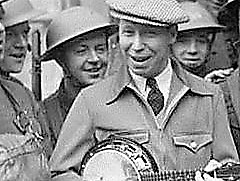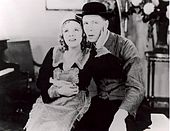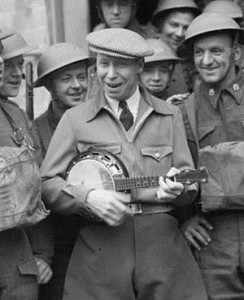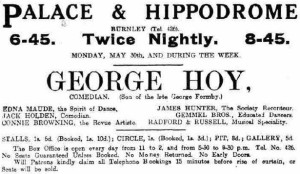Off the Dole ** (1935, George Formby, Beryl Formby, Constance Shotter) – Classic Movie Review 12,199
George Formby performs his 1933 hit ‘With My Little Ukulele In My Hand’ (composed by Jack Cottrell) in the film Off the Dole (1935), plus The Twilight Blondes, The 16 Boy Choristers, The 12 London Babes and The 24 Bathing Belles.
Director Arthur Mertz’s 1935 film Off the Dole stars George Formby, in his second feature film (after the 1934 Boots! Boots!), again as his father’s music hall stage creation John Willie, a jobless layabout put in charge of his uncle’s private investigation business, who manages to flummox some villains, particularly the local Mr Big (McLaglen) who has so long evaded the cops.
Off the Dole is a slack comedy with a so-so star role for a young talent on his way to huge success. But George Formby still manages to shine in an eager-to-please, bright, cheeky turn cramped within a scenario that appears to have suffered greatly from severe budgetary limitations. But, joy of joys, George Formby performs his legendary 1933 smutty hit ‘With My Little Ukulele In My Hand’ (composed by Jack Cottrell).
Also in the cast are Beryl Formby, Constance Shotter, Dan Young, Clifford McLaglen, Tully Comber, Wally Patch, James Plant [Jimmy Plant], Stan Pell, Stan Little, Len Martin and Daisy Maynard, with vintage entertainment from The Twilight Blondes, Arthur L Ward and His Band, The 16 Boy Choristers, The 12 London Babes and The 24 Bathing Belles.
After this, Formby left the Mancunian Film Manchester studios for the big time in London.
Stan Little, who plays a seven-year-old boy, was 24.
Producer John E Blakeley employs several members of his family on the film. His father James is in charge of business affairs, his son Tom Blakeley is Assistant Cameraman and his son-in-law Frank P Atherton is Art Director. Also his close friend Arthur L Ward is Musical Director and appears with His Band.
George Formby sings his other famous song ‘Leaning On A Lamp Post’ (composer Noel Gay) in the film Feather Your Nest (1937).
George Formby OBE was born George Hoy Booth (26 May 1904 – 6 March 1961). He made his first professional appearance in a two-week run at the Hippodrome in Earlestown, Lancashire, on 21 March 1921, billed as George Hoy, using his mother’s maiden name.






